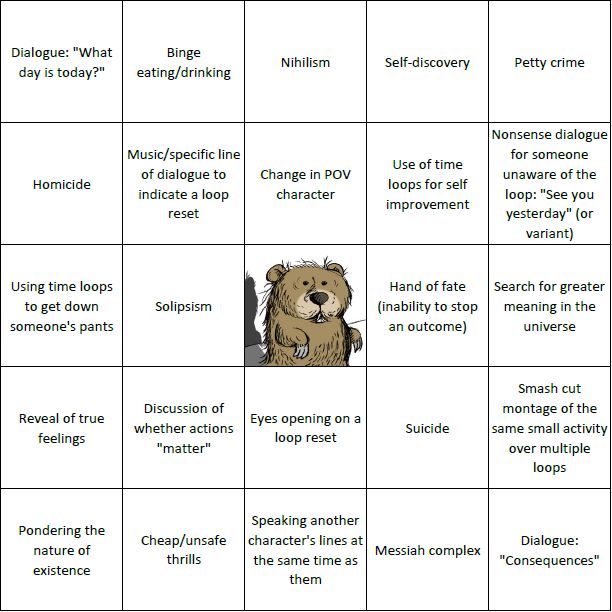Do We Need Yet More Films About Time Loops? A Pretty Much Pop Discussion (#80) of Groundhog Day and its Descendents

Tine looping, where a character is doomed to repeat the same day (or hour, or longer period) is a sci-fi trope dating back more than a century, but really entered American consciousness with the 1993 Bill Murray film Groundhog Day. Since then, and especially in the last five years, there have been numerous iterations of this idea in various genres from racial police-shooting drama to teen sex comedy. But do we need more of this? What are the philosophical ideas involved, and how do these change with tweaks to the scenario?
Mark, Erica, Brian, and returning guest Ken Gerber discuss not only the very recent and popular forays into this genre with Hulu’s Palm Springs and Netflix’s Russian Doll, but also touch on Edge of Tomorrow, Repeaters, 12:01 PM, Before I Fall, The Fare, and episodes of The Twilight Zone, Star Trek: Discovery, The X-Files, and Rick & Morty.
There are of course other film and TV uses of this trope. For a relatively full list, you can see this wiki page listing time loop films and this other wiki page discussing literary antecedents. Also see the “Groundhog Day” Loop page on tvtropes.org, and here’s a relevant reddit thread.
Here are more articles:
- “Catch a Movie About Time Loops” by Noel Murray (This came out after we recorded, so we missed out on Source Code and Final Girls.)
- “From Groundhog Day to Russian Doll, the Inescapable Power of the Time Loop” by Jen Chaney
- “Time-Loop Stories Are About Being Stuck, but the Genre Keeps Moving Forward” by Karen Han
- “How the ‘Palm Springs’ Team Found a New Wrinkle in the Time-Loop Movie” by Jake Kring-Schreifels
- “What the Ambiguous Ending of Netflix’s ‘Russian Doll’ Means for the Show” by Esther Zuckerman (Yes, there is a season 2 coming out this year)
- “Behind the Scenes of New Short Film, ‘Two Distant Strangers,’ About Police Killings in America” by Degen Pener
Watch the 12:01 PM 1990 short film. This bonus episode of the 11.22.63 podcast had a great discussion of time loop media including the Ken Grimwood novel Replay and the short story “12:01 P.M.” and its sequels. You can read the 1941 Malcolm Jameson story “Doubled and Redoubled” online. As a forerunner to the time loop idea, check out the very short 1892 children’s story “Christmas Every Day” by William Dean Howells, where time does move forward with its consequences, but it’s always Christmas!
We talked a little about Happy Death Day with its costume designer in our ep. 38 and got into time travel more generally with Ken in ep. 22 and into “weird situations” in our Twilight Zone ep. 52. You may also enjoy Wes Alwan’s (sub)Text podcast discussing the psychological implications of Groundhog Day.
Check out the time loop movie bingo card that Brian put together (with groundhog picture by Ken):
Hear more of this podcast at prettymuchpop.com. This episode includes bonus discussion that you can access by supporting the podcast at patreon.com/prettymuchpop. This podcast is part of the Partially Examined Life podcast network.
Pretty Much Pop: A Culture Podcast is the first podcast curated by Open Culture. Browse all Pretty Much Pop posts.
Do We Need Yet More Films About Time Loops? A Pretty Much Pop Discussion (#80) of Groundhog Day and its Descendents is a post from: Open Culture. Follow us on Facebook, Twitter, and Google Plus, or get our Daily Email. And don't miss our big collections of Free Online Courses, Free Online Movies, Free eBooks, Free Audio Books, Free Foreign Language Lessons, and MOOCs.
from Open Culture https://ift.tt/3axt3Fk
via Ilumina

Comments
Post a Comment